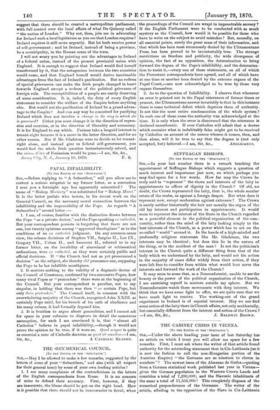PAPAL INFALLIBILITY.
[TO THE EDITOR OF THE "SPECTATOR."]
SIR,—Before replying to "A Subscriber," will you allow me to correct a serious misprint in my former letter, as a correction I sent you a fortnight ago has apparently miscarried ? The name of "Bishop Moriarty" was substituted for "Bishop Maret." It is the latter prelate who insists, in his recent work on the General Council, on the necessary moral connection between the infallibility and the impeccability of the Pope. As regards "A Subscriber's" second letter :—
1. I am, of course, familiar with the distinction drawn between the Pope "as a private doctor," and the Pope speaking ex cathedra. But your correspondent persists in forgetting that there are not one, but twenty opinions among "approved theologians" as to the conditions of an ex cathedra judgment. On any common-sense view, the solemn decisions of Stephen VII., Sergius II., Leo IX., Gregory VII., Urban IL, and Innocent II., referred to in my former letter, on the invalidity of simoniacal or schismatical ordinations, were ex cathedra, as they were certainly public and official decisions. If "the Church had not as yet pronounced a decision" on the subject, she thereby did pronounce one, supposing the Pope to be her infallible mouthpiece.
2. It matters nothing to the validity of a dogmatic decree of the Council of Constance, confirmed by two successive Popes, how many rival Popes or "pretenders" there were at the beginning of the Council. But your correspondent is peculiar, not to say singular, in holding that there was then "no certain Pope, but only three pretenders." The Council itself, in common with the overwhelming majority of the Church, recognized John XXIII. as certainly Pope until, for his breach of his oath of obedience and his many crimes, it had formally deposed him.
3. It is fruitless to argue about generalities, and I cannot ask for space in your columns to disprove in detail the monstrous assumption, for such I am convinced it is, that "almost all Catholics" believe in papal infallibility,—though it would not prove the opinion to be true, if it were so. Quod semper is quite as essential a note of Catholic doctrine as quod al, omnibus.—I am,


































 Previous page
Previous page